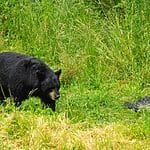Ever thought about what to do if ever stuck in a wolf attack? The horrible scenario of encountering a dangerous wolf in the wild can shock or frighten anyone, even the most experienced hiker or camper.

Wolves are incredibly powerful and efficient predators, and an encounter with one can quickly turn dangerous. However, with the right info and preparation before leaving to stay in wolf territory, you can significantly increase your chances of survival.
In this blog post, we’ll take a deep dive into how to survive a wolf attack, providing useful tips and methods to teach you how to survive a wolf encounter.
How do Wolves hunt prey?
Wolves are apex predators and are known for their unique hunting tactics. Unlike other predatory animals, wolves form packs for hunting, allowing them to take down larger prey easily.
Once they have identified their prey, the wolf pack will work together to encircle the animal, creating confusion and panic. The wolves begin their attack, targeting the weakest or most vulnerable members.
Their tactics involve a combination of biting, chasing, and wrestling, with each member of the wolf’s pack playing a specific role. While larger prey may take longer to bring down, wolves are patient hunters and will work together until they have successfully caught their prey.
One of the biggest strengths of wolves is their pack cause a lone wolf would have a harder time taking down its prey.
Keep all children and injured people in the center, as when wolves attack herds of prey, and they target the weakest ones.
Do Wolves Attack Humans for No Reason?
Wolves have a negative reputation, and many people assume they are life-threatening animals for humans.
However, the reality is quite different. Usually, wolves don’t prey on humans, but in rare cases, they can attack humans, like if they are hungry and can’t find food or any other food sources.
Attacks on humans are extremely rare and usually occur in areas where wolves have been habituated to human presence or have lost their natural fear of humans.
In most cases, such attacks can be prevented by taking simple precautions such as avoiding areas where wolves are known to be active, traveling in groups, and keeping dogs on a leash.
While wolves can be dangerous, they are generally not a threat to humans and should be respected as important members of our ecosystem.
How to Survive a Wolf Encounter?
If you ever find yourself in a situation where a wolf is confronting you, it’s essential to know how to survive the encounter and securely escape from it. Let’s explore the dos and don’ts of surviving a wolf attack.
Avoid Triggering Grey Wolf for an Attack
Wolves are known as coursing predators, which means they take their prey on the run. Watch wolves hunt. You’ll immediately see this in action.
Wolves will attempt to get the animals they prey upon to run. If they don’t run, wolves usually avoid pursuing the attack.
So to avoid triggering an attack, it is important to remain calm and avoid direct eye contact. As they hunt prey on the run, they won’t attack you if they find you to stay calm.
Then start moving backward slowly while making yourself appear as large as possible by raising your arms or opening your jacket. Do not turn your back on the wolf or run, as this may trigger a chase response in the wolf.
If the wolf continues approaching, try to create a barrier between yourself and the wolf, such as a tree or large object.
Remember, the best way to avoid a wolf attack is to give the animal plenty of space and leave the area as quickly and safely as possible.
Bear Spray works on Wild Wolves to Survive a Wolf Attack.
Bear spray is an effective deterrent against bear attacks, but is it also effective in defending from wolves?
While there is limited research on the effectiveness of bear spray on wolves, wolves are generally more cautious than bears and may be scared off by loud noises or aggressive gestures.
However, the bear spray may be effective in stopping the attack, but it won’t come with any guaranteed safety. That’s why you should not be relied upon on this as the sole means of defense against wolves.
It is important to take precautions when traveling in a wolf habitat and to carry multiple objects for your safety whenever you go camping or hiking.
Shout at the Wolves and step backward.
Shouting at wolves and stepping backward during a wolf attack may seem counterintuitive, but it’s an effective way to deter the animal from attacking further.
Wolves are known to be fearful of loud noises, so shouting at them can startle them and make them back off.
However, it’s important to maintain eye contact with the wolf while shouting, as breaking eye contact can signal weakness and make the animal more likely to attack.
Stepping backward slowly can also show the wolf that you’re not a threat and give it space to retreat.
How to Fight Back if Wolf Encounters?
The first and foremost thing you must do in a wolf attack is to stay calm and avoid making sudden movements, as this posture will show that you are not any threat to the wolf.
If the wolf continues to attack, try to use any objects you have nearby you. Use rocks, sticks, or any solid thing that can be thrown at the wolf to stop it from attacking you.
If you have no other option except to fight back, aim for its eyes or nose, as these are its most vulnerable areas. Note that they are intelligent animals and are not typically aggressive toward humans unless provoked or threatened.
How to Handle a Wolf that Isn’t Afraid of Humans?
A fearless wolf attacking you can be a much more troubling situation than one who is scared of humans. But you can escape from this alive or not even get severely injured if you know how to handle such a situation wisely.
The first step in handling the situation is to avoid direct eye contact, as this can be perceived as a threat. Next, slowly back away while maintaining a calm and assertive demeanor.
If the wolf continues approaching, try making loud noises or throwing objects to deter it. Never run away, as this can trigger the wolf’s predator instinct.
It’s also important to report any wolf sightings to local authorities, as they can monitor the situation and take necessary precautions to ensure the safety of humans and wildlife.
Hiking with Your Domestic Dogs
Hiking with domestic dogs in wolf territory can be extremely dangerous, not only for the dogs but also for the hikers as well. Wolves are highly territorial animals, and when they sense the presence of dogs, they can become aggressive and attack.
This is because wolves see dogs as a potential threat, and their mere presence can trigger a defensive response.
Additionally, if a dog barks, growls, or shows any signs of aggression toward wolves, it can further escalate the situation and provoke an attack.
Therefore it is crucial for hikers to be aware of the risks involved and to take appropriate precautions, such as keeping their dogs on a leash, avoiding wolf territory altogether, and carrying pepper spray or other forms of protection.
Wolves dislike Fire
When camping in wolf territory, lighting up a fire can be a lifesaver. Wolves are typically afraid of fire and will avoid approaching it.
By having a fire burning, you create a safe zone around your campsite that wolves are unlikely to cross. Additionally, the smoke rises from the fire can act as a deterrent for wolves, as they have a strong sense of smell and may be repelled by the scent
Wolves hate fire, and a smoky campfire will discourage a wolf from coming too near. If you are alone and you find a wolf nearby, then climb a tree, as wolves cannot climb trees.
There are chances that you may be in for a long wait, however, and could find yourself surrounded by a full wolf pack in time.
Avoid solo camping and backpacking areas where Wolves roam freely
Solo camping and backpacking can be a thrilling experience, but it’s essential to take proper precautions when venturing into the wilderness. One of the most significant risks to consider is the presence of wolves in the area.
It’s crucial to avoid solo camping and backpacking areas where wolves roam freely, as the risk of a dangerous encounter increases significantly. Instead, consider traveling with a group or hiring an experienced guide who knows the area and can help you stay safe.
Humans imitate Wolf Howls
Imitating lone wolf’s howl might seem like a fun and harmless activity, but it can have serious consequences.
When humans mimic wolf vocalizations in their territory, it can disrupt their natural communication and territorial behavior, leading to aggression and defensive actions by the wolves. This can result in dangerous encounters for both humans and wolves.
It is crucial to respect the boundaries and behavior of wildlife and refrain from actions that can disturb their natural habitat and behavior.
Conclusion
knowing how to survive a wolf attack can be a lifesaver if you live, work, or go camping in wolf-inhabited areas. The best ways to defend yourself include avoiding eye contact, keeping calm, and backing away slowly.
If the wolf charges, stand your ground and make yourself look as large and loud as possible. Use bear spray or a loud whistle to scare the wolf, and do not turn your back on it until you are out of danger. Remember, wolves rarely attack humans, and if they do, it is often a result of feeling threatened or provoked.
Frequently Asked Questions
How do I survive a wolf attack?
If you ever encounter a wolf, it’s crucial to remain calm and avoid running. Make yourself look bigger, shout and throw objects to intimidate the wolf, and give yourself a chance to slowly stepped away to safety.
How do you defend yourself against a wolf?
Make yourself appear larger by standing tall, waving your arms, and opening your jacket if you’re wearing one. Back away slowly while keeping eye contact with the wolf, and if the wolf attacks, use pepper spray or any object you can find as a weapon.
Can I beat a wolf in a fight?
It’s highly unlikely that a human could beat a wolf in a fight. Wolves are powerful predators with sharp teeth and claws, and they are highly skilled at taking down prey. Engaging in a fight with a wolf could result in serious injury or even death for a human








